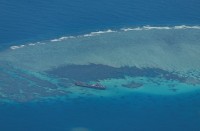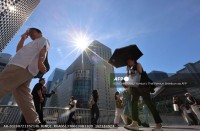
BRUSSELS, Belgium (AFP) – EU nations remained split Monday over banning Russian energy imports, as a top official from the bloc decried “a massive war crime” being carried out by Moscow in Ukrainian city Mariupol.
But foreign and defence ministers meeting in Brussels did give the green light to doubling a financial package for arms to Ukraine to 1 billion euros.
The EU and Western allies have unleashed a barrage of sanctions that have battered the Russian economy as they look to punish President Vladimir Putin for invading his neighbour.
Some members states, including the Baltic countries and Ireland, have pushed to hit Russia’s key oil exports in a new round of sanctions.
But economic powerhouse Germany — and other nations still reliant on Russian fossil fuels — have been reluctant to target the key sectors.

“Today was not a day to take decisions in the area, so no decision was taken,” EU foreign policy chief Josep Borrell said.
“What we need to do is ensure that we come with an effective response which won’t lead to an unbearable cost for member states.”
Irish Foreign Minister Simon Coveney said energy was an “obvious area where if we want these sanctions to bite we should be focusing”.

“But it’s not that straightforward, unfortunately and that’s because a number of EU member states have a very significant reliance on Russian oil and gas.”
He said the ministers had now effectively set the scene for EU leaders to progress with a decision at a summit later in the week.
The debate over a fresh round of sanctions comes as Russia presses on with its devastating attack on Ukrainian cities — especially the port of Mariupol.
“What’s happening now in Mariupol is a massive war crime, destroying everything, bombarding and killing everybody,” Borrell said.
He also accused Russia of pushing as many Ukrainians as possible to flee the country, after more than 3 million have fled over the border towards the EU.
“I am convinced that Putin is using the refugees as a as a tool, as an arm, sending as much as they can,” Borrell said.
“They haven’t destroyed the transport infrastructure, they just destroyed the cities in order to terrify the civilians and make them escape.”
In a bid to support Kyiv, the EU has turned arms provider to fund deliveries of weapons to help Ukrainian forces fights back against the Russian invaders.
Borrell said that ministers gave their political agreement Monday to adding an extra 500 million euros ($550 million) of funding to a package to finance arms for Ukraine.
The move — which is expected to be formally signed off on later this week — is part of a broad Western push to help Ukraine keep up its ferocious resistance.
© Agence France-Presse








